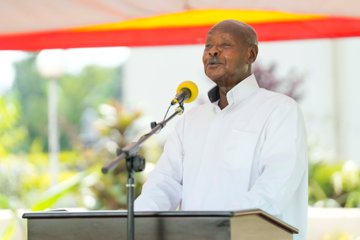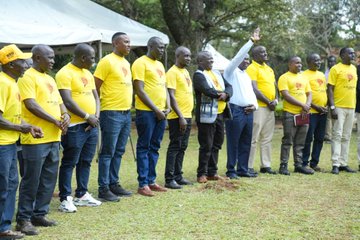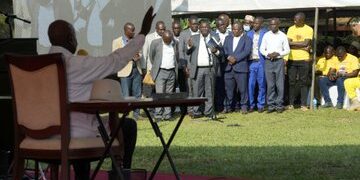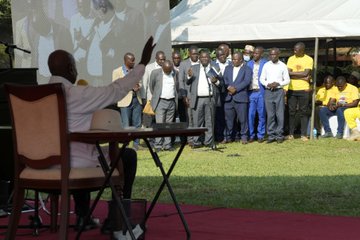Jinja — President Yoweri Kaguta Museveni has directed that indigenous fishermen take the lead in managing Uganda’s lakes, supported by the Uganda Peoples’ Defence Forces (UPDF) Fisheries Protection Unit (FPU), in a move aimed at restoring order, boosting livelihoods, and ensuring sustainable management of the country’s aquatic resources.
The directive was issued during a high-level consultative meeting held at the State Lodge in Jinja, bringing together fishing communities from across the country, including indigenous fishermen, boat owners, district fisheries officers, and leaders of fishing associations.
“This part of Africa is our ancestral home,” said President Museveni. “We must empower those with omwooga—the traditional skill in fishing—to transform this sector.”
A Sector Under Reform
The President emphasised that indigenous fishermen must play a central role in protecting lakes, especially against illegal fishing practices, cross-border intrusions, and environmental degradation. The UPDF will continue to support operations, particularly in border waters, while ensuring legal fishing activities are protected.
“The army’s presence is not permanent,” Museveni stressed. “Our long-term strategy is to build a skilled, self-sustaining fishing industry led by Ugandans. Now that we have peace, let’s organise this sector and eventually return the army to the barracks.”
Reviving Uganda’s Fishing Heritage
President Museveni recalled his early efforts to commercialise Uganda’s fish industry, including the establishment of the country’s first fish processing plant at Masese using a $14 million Italian grant. However, disorder and the rise of illegal gear later forced the government to deploy the army to restore control.
“I had to bring in the army because the fishing activity had become lawless—dominated by opportunists. But now we’re organised. We have peace and time to plan,” he said.

He noted that, unlike other agricultural sectors, which have stabilised without security intervention, lakes face unique pressures requiring continued protection until robust systems are in place.
Capital Investment and Aquaculture Drive
Recognising the capital-intensive nature of the sector, President Museveni proposed a specialised fisheries fund, separate from the Parish Development Model (PDM). While PDM allocates UGX 100 million per parish, Museveni said each fishing SACCO would receive UGX 1 billion to meet its unique needs.
He also urged communities to shift from over-reliance on lakes to fish farming, citing success stories from Limoto and Kawumu where fish ponds generate over UGX 80 million annually. The government, he assured, is ready to support pond construction.
“We misuse wetlands and underutilise drylands. We must organise fish farming and conserve our natural resources,” he said.
Crackdown on Illegal Gear and Strengthening Infrastructure
President Museveni declared that the government will criminalise the importation of illegal fishing nets and threads, based on intelligence received from ISO.
“I have received reports. We must stop this menace. Even the threads used to make the banned gear will be outlawed,” he stated.
He also instructed Third Deputy Prime Minister Hon. Rukia Nakadama to ensure landing sites have clean water, health facilities, and schools—especially in remote areas and islands like Kalangala, Koome, and Buvuma. He proposed the establishment of boarding schools on major islands to improve education access.
Security and Environmental Protection
President Museveni revealed plans to direct the Uganda Police to create a special water safety unit to enhance emergency response on water bodies.
Regarding environmental preservation, he emphasised the protection of fish breeding zones (byondo), saying lake shores and swamps must be gazetted and kept free from encroachment.
“These breeding zones are like our national parks in water. No one should build there. Preserving them is critical to sustaining the fish economy, which globally is even larger than coffee,” he noted.
He linked the problem of floating vegetation to wetland destruction, calling for stricter conservation measures.

Building a Sustainable Future
The President reiterated the relevance of the NRM’s 10-point program, particularly Point 5, which advocates for building an independent and self-sustaining economy. He warned against foreign economic models that marginalise local actors.
“We must modernise our people. The goal is not to keep a few rich and many poor. Everyone must be part of the transformation,” he asserted.
Museveni praised fishermen already diversifying into other enterprises—such as piggery, retail, and hospitality—and encouraged such efforts as part of the transition from subsistence to a money economy.
Voices from the Sector
Mr. Kato David, chairperson of the Bakenye (indigenous fishermen), called for communities to be at the centre of fishing sector reforms, using ancestral knowledge to preserve breeding areas and regulate seasons.
Mr. Sunday Gerald Kayita, NRM chairperson for Kalangala, emphasised the need for harmonised regional fishing laws to curb cross-border illegalities.
In response to concerns from Buliisa and Kasensero, Museveni assured stakeholders of enhanced lake surveillance, including radar systems to monitor Lake Albert and plans to deploy similar technology on Lake Victoria.
President Museveni directed the Ministry of Agriculture, Animal Industry and Fisheries to complete draft regulations to guide the fishing sector within one month.
He also proposed the establishment of skills development centres for youth in fishing communities and deeper investments in aquaculture as long-term solutions for reducing pressure on natural lakes.
The meeting was attended by senior government leaders, including: Rt. Hon. Rebecca Kadaga, First Deputy Prime Minister and Minister for East African Community Affairs, Hon. Rukia Nakadama, Third Deputy Prime Minister, Hon. Babirye Milly Babalanda, Minister for the Presidency, Dr. Kenneth Omona, Minister of State for Northern Uganda, Hon. Hellen Adoa, Minister of State for Fisheries and Hon. Diana Mutasingwa, Minister of State in the Office of the Vice President.









